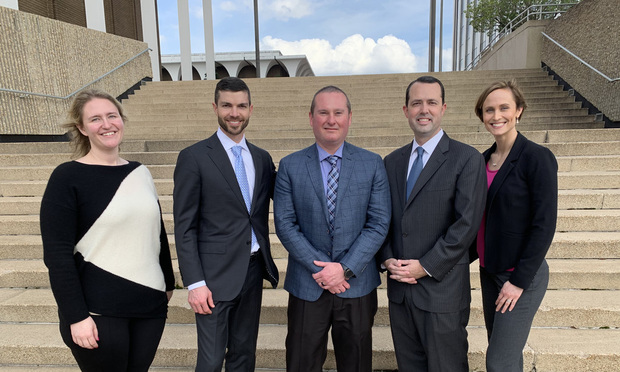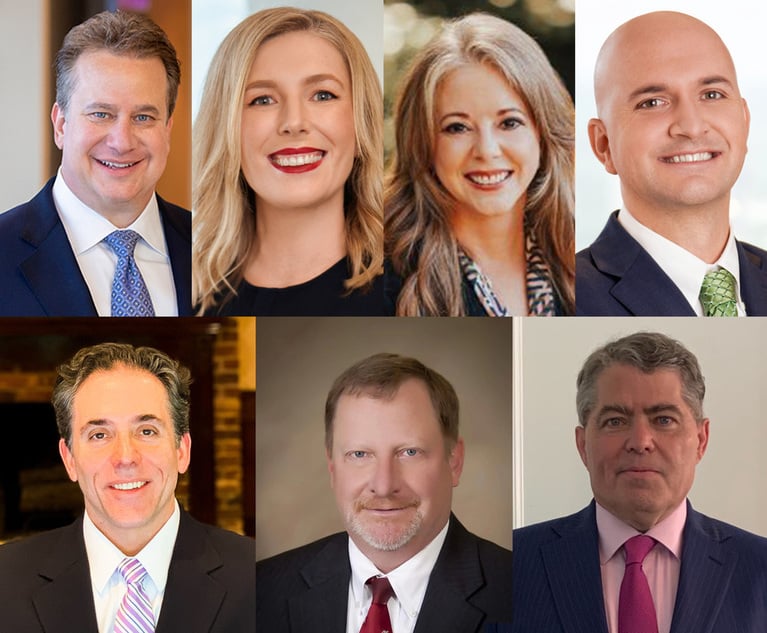While a Pandemic Broke Out, a Trial Went On: Here's What the 'Last' Jury Did
"It was probably one of the last civil jury trials we're going to see for a little while, given the COVID-19 outbreak and the shutting down of courthouses across the state," said winning plaintiffs counsel M. Chase Swanson of Jones & Swanson.
March 26, 2020 at 10:20 AM
6 minute read
 Ashley Heinen (from left), Chase Swanson, Michael Wells, Drew Ashby and Maegan Knight of The Ashby Firm. (Courtesy photo)
Ashley Heinen (from left), Chase Swanson, Michael Wells, Drew Ashby and Maegan Knight of The Ashby Firm. (Courtesy photo)
A jury in Columbus returned a $2.775 million verdict for an injured Cherokee County law enforcement officer on March 13, just before the new coronavirus pandemic shuttered courts and all nonessential gatherings in Georgia.
"It was probably one of the last civil jury trials we're going to see for a little while, given the COVID-19 outbreak and the shutting down of courthouses across the state," said winning plaintiff's counsel M. Chase Swanson of Jones & Swanson in Marietta. "So many things happened in that trial that will never happen again."
The verdict entitles Lt. Michael Wells to collect his own $1 million of uninsured motorist coverage for a crash that happened on Interstate 85 between Atlanta and Columbus in 2012. He was returning home from a law enforcement training program at Columbus State College. Wells has incurred about that much in medical bills for neck and back pain since he was hit from behind by a flatbed truck. He settled with that driver and the driver's employer.
But all parties agreed that the true cause of the crash was a sudden U-turn made by the driver of a blue minivan that fled the scene as cars piled up in its wake, according to documents filed by both sides.
Andrew "Drew" Ashby of the Ashby Firm in Atlanta, who tried the case with his longtime friend Swanson, said, "Life was completely normal the Sunday we drove down to Columbus to start the trial."
They rode in a crowded elevator up to the 11th floor of the Muscogee County courthouse in downtown Columbus without thinking about hand sanitizers or viral droplets.
"Nobody was using the words 'social distancing,'" Swanson said. "It wasn't a big deal—until the end of the week."
It took all day Monday to pick the jury. The plaintiffs lawyers finished presenting their case on Wednesday. Around the same time, the World Health Organization declared the coronavirus to be a global pandemic. But the lawyers were laser focused on the trial.
On Thursday, the defense rested. Closing arguments were made. The case went to the jury around 4 p.m.
That same day, March 12, Georgia Supreme Court Chief Justice Harold Melton took the unprecedented step of asking people not to come to court. "All of us are being asked to do whatever we can to prevent the spread of this new virus," Melton said in a news release on that day. "These steps—while inconvenient—are necessary at this time, and I believe are responsible actions."
Later in the day Thursday, Melton held an emergency telephone meeting with judges representing all classes of courts, asking them to consider limiting all nonessential functions across the state for at least two weeks. State law allows for the chief judge of each circuit to declare a local judicial emergency and suspend jury trials or take other measures, Melton noted. He added he had not yet declared a statewide judicial emergency but that a number of superior court judges had asked about suspending jury service, jury trials, and other matters in their circuits. He said those actions would be consistent with Gov. Brian Kemp's directives to local governments, giving them the authority to close offices, schools, and take other actions they deem necessary to protect their communities. Melton cited a template of an order that would allow the chief judge of a judicial circuit to take action to protect the public and court employees. Melton said he and Presiding Justice David Nahmias told the judges that if they decide to declare local judicial emergencies, they should alert local officials about their plans.
That Friday morning, the jury for the Wells case returned to resume deliberating, and Fulton County Superior Court Chief Judge Christopher Brasher declared a judicial emergency, shutting down his court for all but essential functions. Other chief judges began contemplating and issuing similar orders.
One of those chiefs—Muscogee County Superior Court Chief Judge Gil McBride—was hearing the Wells case. He told the lawyers he was concerned that, if they didn't have a verdict soon, they'd have a problem. Later that afternoon, President Donald Trump declared a national emergency to free up federal disaster relief funds. The next day, Gov. Brian Kemp declared a statewide emergency. Melton followed that Saturday evening with a judicial emergency order halting jury trials and all nonessential functions.
But around lunchtime that Friday, March 13, the jury returned with a verdict: $800,000 for past medical expenses, $250,000 for future medical expenses, $600,000 for past pain and suffering, and $1.125 million for future pain and suffering. The jury apportioned 10% of the fault to the driver, who had already settled out of the case, 90% to the unidentified driver of the blue minivan—represented at trial by Marc Bardack and E. Andrew Treese of Freeman Mathis & Gary, the lawyers for Wells' uninsured/underinsured motorist policy carrier, OneBeacon Government Risks.
They said Wednesday they did not have authorization from their client to discuss the case.
Although the UM policy was for $1 million, the only offer OneBeacon made was for $25,000, Swanson said. He has been working on the case for eight years, along with paralegal Ashleigh Heinen. Ashby and his paralegal, Maegan Knight, joined them in the weeks before the trial.
While they were waiting for the verdict, the trial team went outside for a break—getting into another crowded elevator—with Wells and his family. The father took a picture of them on the courthouse steps.
Wells, now 38, made the most compelling witness of the trial, Swanson said.
"He had me tearing up as he talked about thinking through the little things to big things he had not been able to do with his kids," Swanson said. "Work is work. He said, 'I've wrapped my mind around the fact that I'll never be on SWAT again.' But he's not been able to be the kind of dad that he would like to be."
If the verdict is not appealed and the UM policy pays its limit, Swanson said, "We will have recovered every last penny we could for him. We're excited about that. I'm happy to have done this for a guy who has done so much for our community."
This content has been archived. It is available through our partners, LexisNexis® and Bloomberg Law.
To view this content, please continue to their sites.
Not a Lexis Subscriber?
Subscribe Now
Not a Bloomberg Law Subscriber?
Subscribe Now
NOT FOR REPRINT
© 2025 ALM Global, LLC, All Rights Reserved. Request academic re-use from www.copyright.com. All other uses, submit a request to [email protected]. For more information visit Asset & Logo Licensing.
You Might Like
View All
Insurer Not Required to Cover $29M Wrongful Death Judgment, Appeals Court Rules

Trying to Reason With Hurricane Season: Mediating First Party Property Insurance Claims


'I Thank You': Attorney Leverages Daily Report Article to Turn $42K Offer Into $600K Settlement
7 minute readLaw Firms Mentioned
Trending Stories
Who Got The Work
J. Brugh Lower of Gibbons has entered an appearance for industrial equipment supplier Devco Corporation in a pending trademark infringement lawsuit. The suit, accusing the defendant of selling knock-off Graco products, was filed Dec. 18 in New Jersey District Court by Rivkin Radler on behalf of Graco Inc. and Graco Minnesota. The case, assigned to U.S. District Judge Zahid N. Quraishi, is 3:24-cv-11294, Graco Inc. et al v. Devco Corporation.
Who Got The Work
Rebecca Maller-Stein and Kent A. Yalowitz of Arnold & Porter Kaye Scholer have entered their appearances for Hanaco Venture Capital and its executives, Lior Prosor and David Frankel, in a pending securities lawsuit. The action, filed on Dec. 24 in New York Southern District Court by Zell, Aron & Co. on behalf of Goldeneye Advisors, accuses the defendants of negligently and fraudulently managing the plaintiff's $1 million investment. The case, assigned to U.S. District Judge Vernon S. Broderick, is 1:24-cv-09918, Goldeneye Advisors, LLC v. Hanaco Venture Capital, Ltd. et al.
Who Got The Work
Attorneys from A&O Shearman has stepped in as defense counsel for Toronto-Dominion Bank and other defendants in a pending securities class action. The suit, filed Dec. 11 in New York Southern District Court by Bleichmar Fonti & Auld, accuses the defendants of concealing the bank's 'pervasive' deficiencies in regards to its compliance with the Bank Secrecy Act and the quality of its anti-money laundering controls. The case, assigned to U.S. District Judge Arun Subramanian, is 1:24-cv-09445, Gonzalez v. The Toronto-Dominion Bank et al.
Who Got The Work
Crown Castle International, a Pennsylvania company providing shared communications infrastructure, has turned to Luke D. Wolf of Gordon Rees Scully Mansukhani to fend off a pending breach-of-contract lawsuit. The court action, filed Nov. 25 in Michigan Eastern District Court by Hooper Hathaway PC on behalf of The Town Residences LLC, accuses Crown Castle of failing to transfer approximately $30,000 in utility payments from T-Mobile in breach of a roof-top lease and assignment agreement. The case, assigned to U.S. District Judge Susan K. Declercq, is 2:24-cv-13131, The Town Residences LLC v. T-Mobile US, Inc. et al.
Who Got The Work
Wilfred P. Coronato and Daniel M. Schwartz of McCarter & English have stepped in as defense counsel to Electrolux Home Products Inc. in a pending product liability lawsuit. The court action, filed Nov. 26 in New York Eastern District Court by Poulos Lopiccolo PC and Nagel Rice LLP on behalf of David Stern, alleges that the defendant's refrigerators’ drawers and shelving repeatedly break and fall apart within months after purchase. The case, assigned to U.S. District Judge Joan M. Azrack, is 2:24-cv-08204, Stern v. Electrolux Home Products, Inc.
Featured Firms
Law Offices of Gary Martin Hays & Associates, P.C.
(470) 294-1674
Law Offices of Mark E. Salomone
(857) 444-6468
Smith & Hassler
(713) 739-1250






